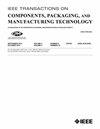用于 2.5/3D 微机电系统集成的新型低温互连:演示和可靠性
IF 2.3
3区 工程技术
Q2 ENGINEERING, ELECTRICAL & ELECTRONIC
IEEE Transactions on Components, Packaging and Manufacturing Technology
Pub Date : 2024-07-17
DOI:10.1109/TCPMT.2024.3430061
引用次数: 0
摘要
为满足高性能微机电系统(MEMS)集成的基本要求,本研究开发了一种新型铜-锰基固液互渗(SLID)互连解决方案。该研究利用包含 Co 层的金属化堆栈与低温铜-锡-铟 SLID 相互作用。由于在 Cu-Sn-In SLID 系统中,Cu6(Sn,In)5 的形成温度低于其他相,因此目标是生产单相 (Cu,Co)6(Sn,In)5 互联器件。为 Cu-Sn-In/Co 系统和作为参考的 Cu-Sn/Co 系统确定了接合条件。通过高温存储 (HTS)、热冲击 (TS) 和拉伸测试对它们的热机械可靠性进行了全面评估。Cu-Sn-In/Co 系统是一种可靠的低温解决方案,具有以下关键特性:1) 相较于 Cu-Sn SLID 互连所需的近 300 °C 粘接温度,该系统的粘接温度降低至 200 °C,从而在互连键合线中实现了稳定的相位;2) 不存在 Cu3Sn 相,从而实现了无空隙互连;3) 热机械可靠性高,抗拉强度超过了 MIL-STD-883 方法 2027.2 中规定的最低要求,尤其是在 150 °C 下进行 1000 小时的 HTS 测试之后。本文章由计算机程序翻译,如有差异,请以英文原文为准。
Novel Low-Temperature Interconnects for 2.5-/3-D MEMS Integration: Demonstration and Reliability
To meet the essential demands for high-performance microelectromechanical system (MEMS) integration, this study developed a novel Cu–Sn-based solid-liquid interdiffusion (SLID) interconnect solution. The study utilized a metallization stack incorporating a Co layer to interact with low-temperature Cu–Sn–In SLID. Since Cu6(Sn,In)5 forms at a lower temperature than other phases in the Cu–Sn–In SLID system, the goal was to produce single-phase (Cu,Co)6(Sn,In)5 interconnects. Bonding conditions were established for the Cu–Sn–In/Co system and the Cu–Sn/Co system as a reference. Thorough assessments of their thermomechanical reliability were conducted through high-temperature storage (HTS), thermal shock (TS), and tensile tests. The Cu–Sn–In/Co system emerged as a reliable low-temperature solution with the following key attributes: 1) a reduced bonding temperature of 200 °C compared to the nearly 300 °C required for Cu–Sn SLID interconnects to achieve stable phases in the interconnect bondline; 2) the absence of the Cu3Sn phase and resulting void-free interconnects; and 3) high thermomechanical reliability with tensile strengths exceeding the minimum requirements outlined in the MIL-STD-883 method 2027.2, particularly following the HTS test at 150 °C for 1000 h.
求助全文
通过发布文献求助,成功后即可免费获取论文全文。
去求助
来源期刊

IEEE Transactions on Components, Packaging and Manufacturing Technology
ENGINEERING, MANUFACTURING-ENGINEERING, ELECTRICAL & ELECTRONIC
CiteScore
4.70
自引率
13.60%
发文量
203
审稿时长
3 months
期刊介绍:
IEEE Transactions on Components, Packaging, and Manufacturing Technology publishes research and application articles on modeling, design, building blocks, technical infrastructure, and analysis underpinning electronic, photonic and MEMS packaging, in addition to new developments in passive components, electrical contacts and connectors, thermal management, and device reliability; as well as the manufacture of electronics parts and assemblies, with broad coverage of design, factory modeling, assembly methods, quality, product robustness, and design-for-environment.
 求助内容:
求助内容: 应助结果提醒方式:
应助结果提醒方式:


